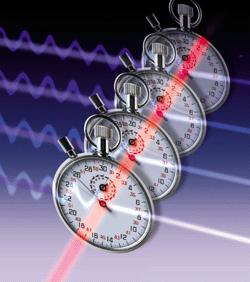MSc thesis project proposal
Distributed clock synchronization for energy-efficient wireless sensor networks
Project outside the university
Holst Centre (Eindhoven)The rapid advances in technology in the past decade has led to both the miniaturization and affordability of sensor systems, enabling the feasibility of large sensor networks. Time synchronization is one of the fundamental challenges in such wireless sensor networks. The on-board clock at each node, typically cheap crystal oscillators with poor long term stability, tend to drift with respect to each other over time. All the independent clocks aboard these sensor nodes must be aligned to maintain coherent communication and data collection. Traditionally, time synchronization within the network is achieved by broadcasting the reference time at sufficient time intervals. However, to conserve energy, nodes may enter prolonged sleep periods which hamper their ability to communicate frequently. In absence of such communication, the node-level clock may drift over time.
The clock drift is typically estimated by posing synchronization as a parameter estimation problem, wherein the inherently non-linear clock at each node is approximated as a polynomial in time for a short time-period. Thereafter, the regression coefficients are estimated using numerous centralized solutions (based on TinySync, MiniSync, TWR protocols). However, for a large network of energy-efficient nodes, synchronization must happen locally with immediate neighbors within timeconstrained boundaries. The sensor network must achieve the global consensus on timing using local information, which calls for more distributed solutions and protocols. An optimal algorithm would not only accurately synchronize, but also must be a reliable and energy efficient solution. Additional challenges involve optimal clock selection, achieving sub-tick time-accuracies and sparsity-exploiting solutions.
Assignment
- Literature survey on the current state of the art for clock synchronization
- Developing algorithm(s) for Distributed clock synchronization
- Simulations to validate the algorithm
- Implementing the solution(s) on the IMEC IoT sensor network
- Testing and analyzing the performance of the implemented algorithm
- Thesis writing and documentation at IMEC-Holst Centre
- (Option) submit the work to a top-ranking publication
Requirements
- Proven experience with MATLAB/Python/C/C++
- Experience with signal processing/machine learning tools
- Knowledge in implementing algorithms with embedded systems
- Experience with clock synchronization is an added plus
- Motivated student eager to work independently and expand knowledge in the field
- Good written and verbal English skills
Contact
prof.dr.ir. Alle-Jan van der Veen
Signal Processing Systems Group
Department of Microelectronics
Last modified: 2019-04-24
